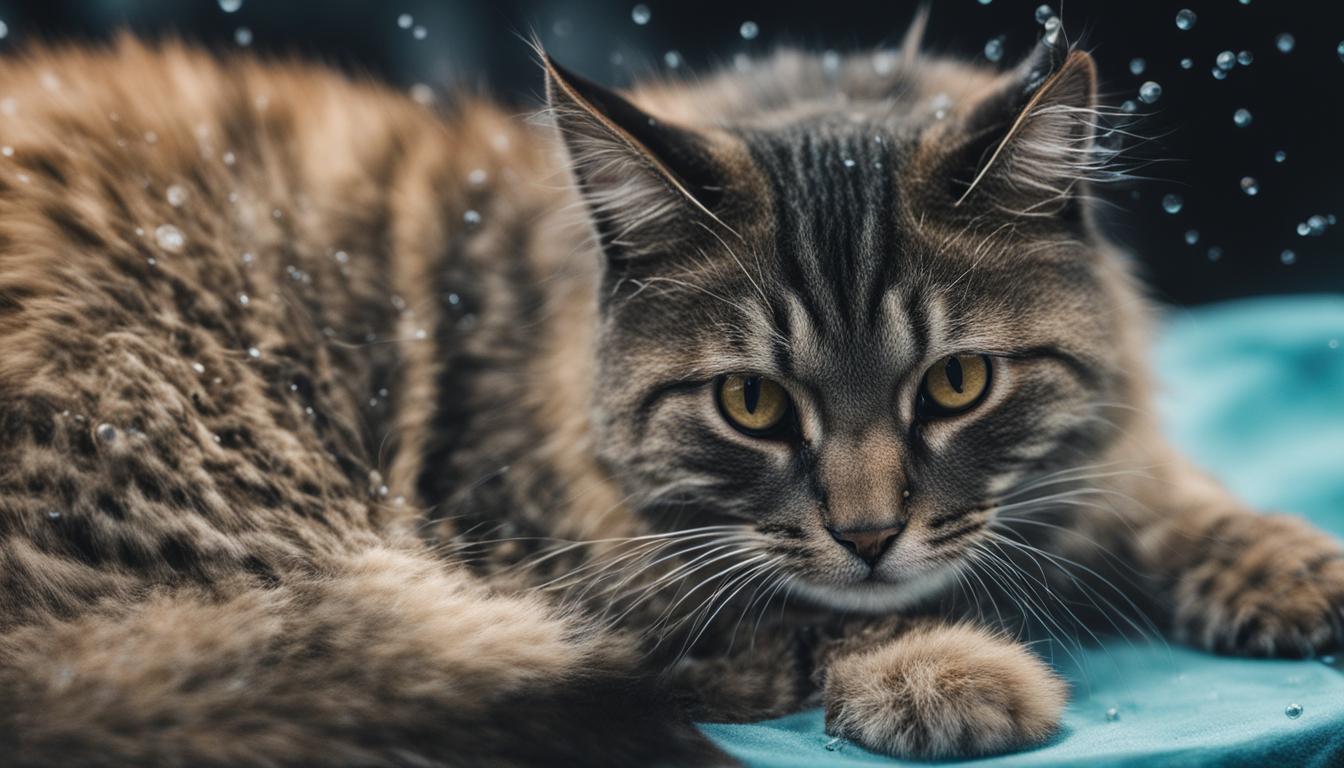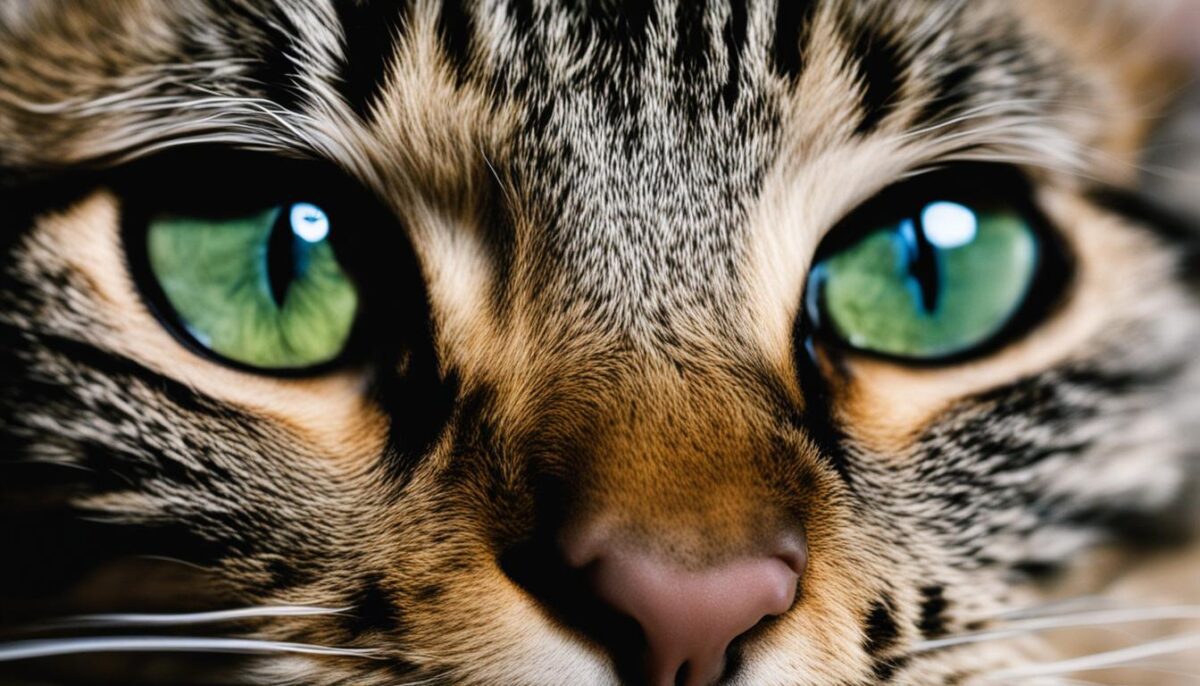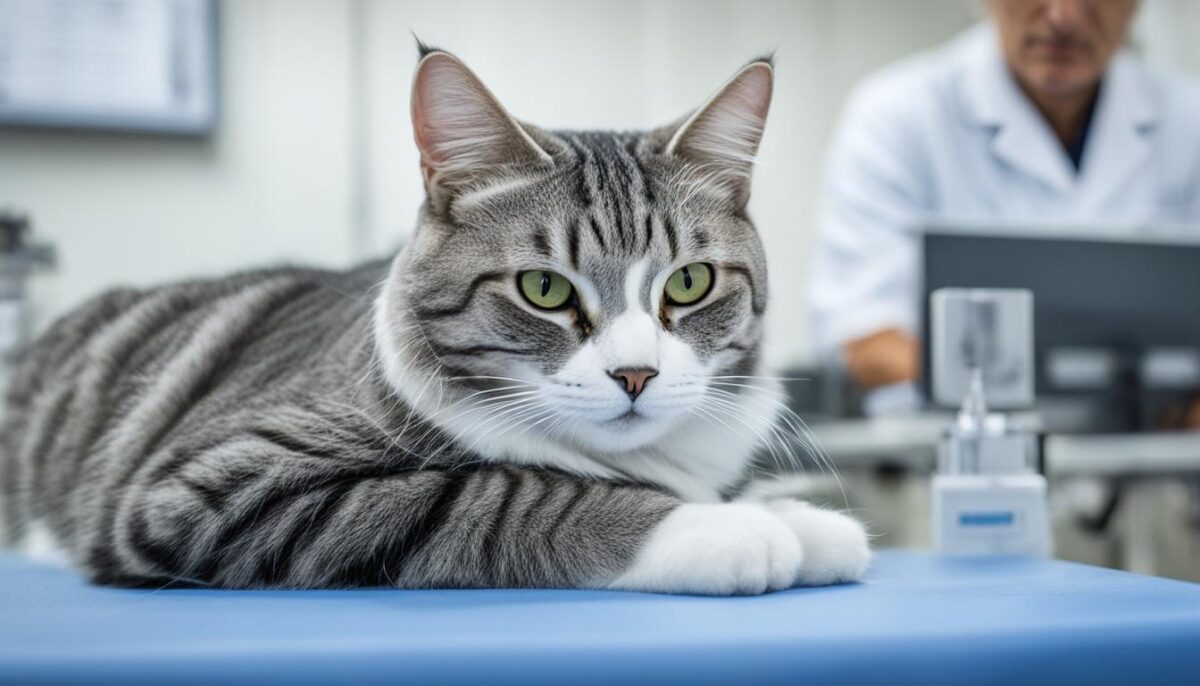Have you ever heard your friends with cats talk about cat flu? It’s actually a health issue for cats called feline herpesvirus or feline viral rhinotracheitis (FHV-1), and yes, your furry friend can catch it too. This sickness makes cats feel lots of discomfort, mainly through affecting their eyes and breathing. Cats pick up this virus mostly by being near other cats who have it—in their saliva, or their runny noses and eyes. In just a few days of catching the virus, a cat can start feeling unwell, but with the right care, they can get better.
It’s your job as a cat owner to know about feline health problems like this one. It’s tricky because once cats get FHV-1, they can’t ever shake it off completely. Still, knowing what to look for can make a big difference. That’s why we’re here to share all the important stuff about cat flu with you.
Key Takeaways
- Feline herpesvirus, also called cat flu, mainly affects a cat’s eyes and nose.
- Cats can get sick with FHV-1 by being around other cats that have it.
- Symptoms often show up 2-5 days after a cat is infected.
- Although FHV-1 stays with cats for life, proper love and care can help manage it.
- Learning about FHV-1 is a key part of keeping your cat healthy and happy.
Understanding Feline Herpesvirus and Its Symptoms
When your cat catches a cold, it could be something called feline herpesvirus. This is a virus that can make cats feel really sick. It mostly lives in their noses and eyes, but it can spread to other parts of their body too.
What Exactly is Feline Herpesvirus?
Feline herpesvirus (FHV-1) is like a cold virus but for cats. Cats can’t give it to people or dogs, but they can easily give it to other cats.
Common Symptoms of Feline Herpesvirus Infection
Cats with feline herpesvirus have feline respiratory symptoms just like when we catch a cold. They might sneeze, have a runny nose, or a fever. They could also have cat conjunctivitis, where their eyes get red and swollen, or something called keratoconjunctivitis sicca, which is a fancy way to say their eyes get really dry and itchy.
Differences Between FHV and Other Cat Illnesses
It’s tricky because feline herpesvirus can look like other cat sicknesses, but there are signs, like the eye problems and not just a stuffy nose, that can help your vet figure out if your cat has an FHV-1 infection.
How Cats Contract Feline Herpesvirus
If you have a cat, you might be curious about feline herpesvirus transmission. Just like people can catch colds from one another, cats can get sick too. One way they can get sick is through cat-to-cat contact. This means that if one cat has the feline herpesvirus, also known as FHV infection, and another cat touches it or uses the same bowl or spoon, they could catch the virus too.
It’s not just touching each other that can pass this virus around. It also lives in wet places like a runny nose or watery eyes. If your cat sneezes or their eyes water, and those drops land on something like a toy or bed, it can get other cats sick. This is what we call environmental contamination. And even if it’s been a while, say half a day or so, these spots can still make your cat sick if they’re still wet.
Let’s look at how long this sneaky virus can live outside of a kitty’s body:
| Where the Virus Lives | How Long the Virus Can Survive |
|---|---|
| On Skin | About 30 minutes |
| On Wet Surfaces | Up to 18 hours |
| Destroying the Virus | With bleach solution |
Baby cats, which we call kittens, those living with lots of other cats, or those who aren’t feeling well, should be extra careful. They can get FHV easier than others. It’s important to keep things clean like food dishes and toys. A grown-up can help by using a special cleaning mix like bleach to kill the virus and keep your kitty safe.
Diagnosing Herpesvirus in Cats
Hey there! If you think your cat may have feline herpesvirus, a vet will look closely at your cat’s health history and the signs they are showing. Since this virus mainly causes sneezing, runny noses, and teary, red eyes, these symptoms can be a clue. But to be sure, the vet has some special tests to do.
The Role of Medical History and Clinical Signs
At first, the vet will look at your cat’s past health, any sickness before, and the kind of symptoms your cat has now. They’ll check how your cat’s eyes look and see if they have a runny nose or are sneezing. Knowing these signs helps the vet think about whether your cat might have the herpesvirus.
Advanced Diagnostic Tools: PCR Testing and More
When it’s time to really check if your cat has this virus, vets have some great tools. One very good way to tell is called FHV PCR testing. It’s like solving a mystery by finding tiny bits of the virus’s DNA. With this test, vets can say “Gotcha!” to the virus.
Another thing vets can do is use a special orange dye called fluorescein dye corneal staining. This dye shows if there are any scratches on your cat’s eye caused by the virus. And there’s a test called the Schirmer tear test, which measures how much your cat’s eyes are watering. If the eyes aren’t making enough tears, it could be from the herpesvirus.
Just remember that sometimes the virus likes to hide and not show up on tests, so even with these smart ways of checking, we might not always see the virus if it’s taking a nap inside your cat.
Treatment Options and Managing FHV in Cats
When your kitty friend catches a cold, it might be something called feline herpesvirus. Don’t worry, doctors for animals have good ways to help!
Addressing Eye Issues with Topical Medications
Special eye drops and gels fight the virus and can make sore eyes better. This is one part of treating feline herpesvirus.
Managing Secondary Infections and Enhancing Comfort
Your vet might also give medicines to help with other sneaky germs. And they’ll tell you how to make your cat cozy, like keeping the room warm and feeding yummy, smelly food to make eating fun.
Long-term Management for Cats with FHV
Some cats might need medicine every day to keep the virus quiet. And to stop the virus from spreading, it’s a good idea to give cats with FHV their own space.
Sometimes kittens get very sick and need extra care, like a special kind of surgery.
Here’s a helpful chart on what might be part of your cat’s care plan:
| Treatment | Description | How it Helps |
|---|---|---|
| Antiviral Medications | eye drops or pills like Famvir® | They attack the virus directly. |
| L-lysine supplement for cats | a special food additive | It could make the virus weaker. |
| Veterinary Supportive Care | checking in with the vet, cozy home care | Keeps your cat feeling loved and comfy. |
Remember, each cat is special, so it’s important to talk to your vet about the best plan for your furry friend. They are there to help you and make sure your cat feels purr-fect.
Protecting Your Cat Against FHV
Understanding feline herpesvirus (FHV) is crucial if you want to keep your furry friend happy and healthy. Cats of any age can catch this virus, but it’s not the end of the world. They can still purr, play, and nap just fine with the right care!
To start protecting pet health, it’s important to stop FHV from spreading. That means keeping things clean and getting your cat vaccinated. Think of it like your cat putting on armor—it helps them stay strong against this sneaky virus.
But what if your cat already has FHV? No worries! With lots of love and some help from the vet, your cat can feel cozy and comfy. Remember, regular check-ups at the vet’s office make a big difference. They’re like secret agents, always looking out for signs to keep your cat healthy.
Now let’s look at some smart moves to stop FHV in its tracks:
- Keep your cat’s living area super clean, which is like giving germs a time-out.
- Get in touch with your vet about vaccines, like scheduling a playdate for protection.
- If your cat feels sniffly or sneezy, it’s vet time! Quick check-ups can lead to quick feel-betters.
Remember, FHV prevention is all about keeping those germs away while making sure your kitty feels loved and cared for. So go ahead, give your cat an extra treat or a longer playtime, because a happy cat is a healthy cat!
With just a bit of effort, you can be a superhero for your pet’s health. And if you ever have questions, your vet is like a friendly guide—always there to help you and your pet on this adventure. Thanks for learning about FHV with us!
Can Cats Get Herpes? What Cat Owners Need to Know
If you’re a cat owner, it’s important to know about a common problem called feline herpesvirus. This virus can make cats feel sick and is very easy for them to pass to other cats. However, you don’t need to worry about catching it yourself or your dog getting it because it only affects cats.
Feline herpesvirus can make cats sneeze, cough, and get watery eyes. It’s like when you catch a cold that bothers your nose and throat. Once a cat gets this virus, they will have it for their whole life, but if you take good care of them, they can still be happy and comfortable. That means going to the vet, giving medicines if needed, and making sure they eat and drink well.
You can also keep your cat healthy by making sure they get their shots and keeping everything clean. It’s all about preventing cat illnesses before they happen, for your pet’s safety. Always talk to your vet about the best way to look after your furry friend so they can stay healthy and play with you for a long time!
FAQ
What Exactly is Feline Herpesvirus?
Feline herpesvirus, also known as feline viral rhinotracheitis (FVR) or FHV-1, is a virus that specifically affects cats, causing upper respiratory illness and eye inflammation. It’s one of the most common causes of respiratory and ocular issues in felines.
What Are the Common Symptoms of Feline Herpesvirus Infection?
Symptoms of feline herpesvirus include sneezing, nasal congestion, runny eyes, eye inflammation, fever, keratoconjunctivitis sicca, or ‘dry eye,’ and a poor appetite. Some cats may also develop corneal ulcers, and severe cases can lead to chronic ocular problems.
How Can I Tell the Differences Between FHV and Other Cat Illnesses?
While many signs can overlap with other feline respiratory diseases, FHV is particularly characterized by ocular symptoms such as conjunctivitis and keratitis. A veterinarian’s evaluation, based on a mix of medical history, clinical signs, and specific diagnostic tests, can help distinguish FHV from other ailments.
How Do Cats Contract Feline Herpesvirus?
Cats contract feline herpesvirus mainly through direct contact with infected cats or contaminated objects, like food bowls, furniture, or human hands. The virus spreads through saliva, and discharges from infected cats’ eyes and noses. It can remain infectious on surfaces for several hours under moist conditions.
How Important is the Medical History and Clinical Signs in Diagnosing Herpesvirus in Cats?
A cat’s medical history and clinical signs are critical in the preliminary diagnosis of feline herpesvirus. Veterinarians will look for indicative symptoms such as eye discharges and assess any history of exposure to other infected cats or stressful environments that can trigger the virus.
What Are the Advanced Diagnostic Tools Available for Detecting FHV?
The most sensitive tool for diagnosing feline herpesvirus is a PCR test, which detects the virus’s DNA. Other diagnostic aids include fluorescein dye corneal staining and Schirmer tear tests that evaluate the integrity and moisture of the eyes, often affected by FHV.
What Topical Medications Are Used for Addressing Eye Issues Caused by FHV?
Eye issues due to feline herpesvirus are often treated with antiviral ophthalmic drops or ointments. In some cases, cats may be prescribed oral antiviral medications like famciclovir (Famvir®) to treat recurrent ocular infections associated with the virus.
How Can Secondary Infections be Managed, and Comfort Enhanced for Cats Suffering from FHV?
Cats with FHV who develop secondary bacterial infections may require antibiotics. Comfort can be enhanced by wiping off nasal and ocular discharges, increasing environmental humidity to help with breathing, and providing strong-smelling foods to encourage eating.
What Does Long-term Management Involve for Cats with FHV?
Long-term management for cats with feline herpesvirus may include regular administration of antiviral medication, L-lysine supplements, isolating the infected cat to prevent spreading the virus, and consistent veterinary follow-ups for continuous support and assessment.
Can Cats Get Herpes? What Should Cat Owners Know?
Yes, cats can get herpes in the form of feline herpesvirus, which is highly contagious among cats but does not transfer to humans or dogs. Cat owners should be vigilant for symptoms of FHV, understand the transmission routes, and recognize that once infected, cats usually become lifelong carriers. Proper treatment and management can significantly improve their quality of life.


